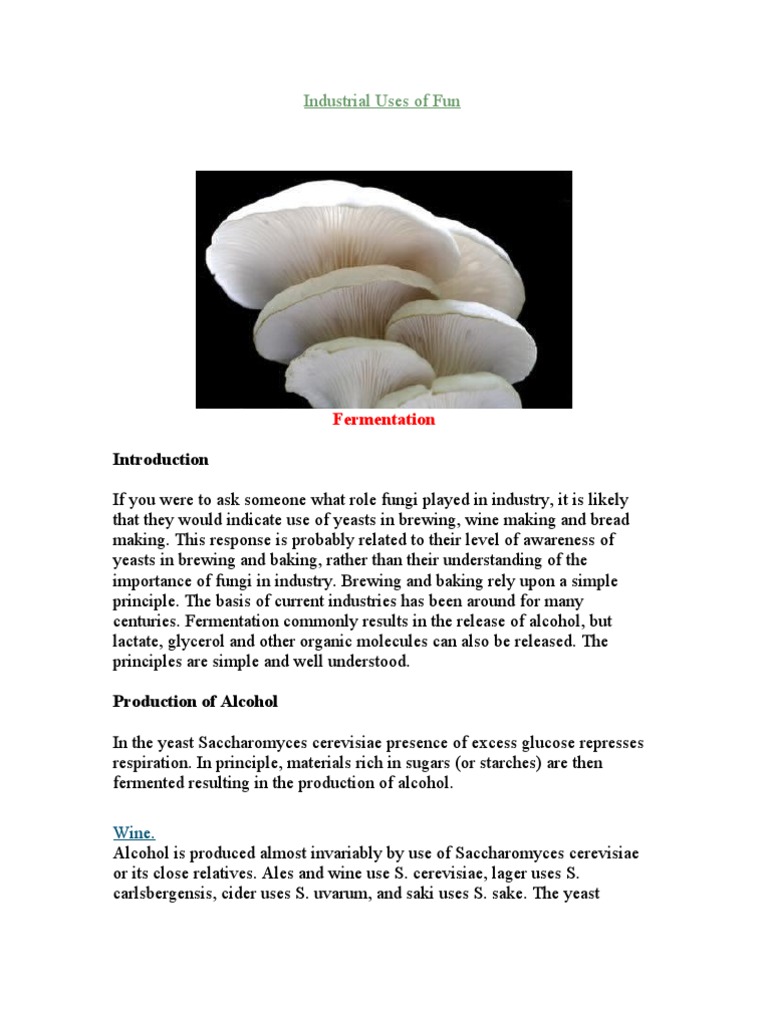The diverse kingdom of fungi encompasses a plethora of species, many of which have transcended their ecological roles to become invaluable players in various industrial sectors. Their unique biochemical properties, metabolic versatility, and ability to thrive in diverse environments render fungi essential for innovations in biotechnology, food production, pharmaceuticals, and environmental sustainability. This article delves into the multifaceted industrial applications of fungi, providing a comprehensive overview of their contributions to modern society.
Understanding the profound implications of fungi necessitates a thorough examination of their various applications across different industries. The following sections elucidate the roles of fungi in food and beverage production, bioremediation and waste management, and pharmaceutical advancements, highlighting the intricate relationships between fungal biology and industrial processes.
Food and Beverage Production: Fermentation and Beyond
Fungi have long been integral to the production of food and beverages, particularly through the process of fermentation. The most noteworthy representative of this domain is Saccharomyces cerevisiae, commonly known as baker’s or brewer’s yeast. This unicellular fungus is pivotal in converting sugars into alcohol and carbon dioxide, making it indispensable in brewing, winemaking, and baking.
The metabolic pathways of Saccharomyces cerevisiae are harnessed not only in alcoholic beverage production but also in the leavening of bread. The production of ethanol through fermentation contributes not only to flavor profiles but also to the preservation of food, as alcohol acts as a natural preservative. Further explorations into the genetic modifications of yeast aim to enhance flavor spectra and fermentation efficiency, thus driving innovations in artisanal brewing and winemaking.
Beyond the realm of fermentation, fungi also play a crucial role in developing umami flavors, as observed in the production of soy sauce and miso, where species like Aspergillus oryzae dominate. The enzymatic action of this filamentous fungi breaks down complex carbohydrates and proteins, releasing amino acids, resulting in rich, savory tastes that elevate culinary experiences across various cultures.
Mycoprotein, derived from the filamentous fungus Fusarium venenatum, exemplifies the potential of fungi as alternative protein sources. As a sustainable, meat-like substitute, mycoprotein is rich in fiber and protein, catering to the growing demand for vegetarian and vegan options. Brands like Quorn have popularized this revolutionary product, showcasing the efficacy of fungi in addressing nutritional challenges while minimizing environmental impacts.
Bioremediation and Environmental Sustainability: Fungi as Nature’s Cleaners
The increasing prevalence of environmental contamination has catalyzed the search for sustainable remediation methods. Fungi, with their innate ability to degrade complex organic compounds, offer effective solutions for bioremediation. Lignin-degrading fungi, particularly white rot fungi such as Phanerochaete chrysosporium, have shown promise in breaking down persistent pollutants, including polycyclic aromatic hydrocarbons (PAHs) and certain pesticides.
These fungi utilize extracellular enzymes, such as lignin peroxidase and manganese peroxidase, to degrade lignin and other complex polymers found in plant material, ultimately leading to the detoxification of hazardous waste. Further research into their metabolic pathways uncovers the potential for engineered fungi to target specific contaminants, enhancing bioremediation efforts in agricultural and industrial settings.
Mycoremediation, a specific application of bioremediation using fungi, employs fungal mycelium to extract heavy metals from contaminated soils. Species like Trametes versicolor can absorb metals such as lead and cadmium, reducing their concentration in polluted environments. This innovative approach not only aids in restoring ecological balance but also presents economic benefits by mitigating the costs associated with traditional remediation strategies.
Moreover, the role of fungi in waste management cannot be understated. Fungi can be employed in composting processes to enhance organic waste degradation. Their enzymatic activities accelerate the breakdown of organic matter, leading to more efficient compost production. This not only reduces landfill contributions but also promotes nutrient recycling in agricultural practices, illustrating fungi’s significance in sustainable waste management.
The Pharmaceutical Frontier: Fungi in Drug Discovery
Fungi have been instrumental in the discovery and production of numerous pharmaceuticals, with penicillin being the most iconic example. Discovered by Alexander Fleming in 1928, the antibiotic properties of Penicillium notatum revolutionized medicine, paving the way for an era of antibiotic therapies. The cultivation and fermentation of fungi have since become critical in producing a wide array of antimicrobials, antifungals, and immunosuppressants.
The search for novel bioactive compounds in fungi continues to hold promise. Recent studies have identified numerous species, such as Aspergillus and Trichoderma, as potential sources of secondary metabolites with anticancer, anti-inflammatory, and analgesic properties. The pharmacological potential of these compounds heralds a new age of drug discovery, emphasizing the importance of traditional mycological knowledge married with modern biotechnological techniques.
Additionally, the production of statins, cholesterol-lowering agents, from fungi such as Aspergillus terreus underscores the economic and health-related significance of fungal biotechnology. The biosynthetic pathways involved in statin production have been elucidated, enabling the development of genetically modified strains with enhanced yield and efficacy. The exploration of fungal metabolites continues to foster advancements in pharmaceutical sciences, ensuring a steady supply of life-saving therapies.
Conclusion: The Prominence of Fungi in Industrial Applications
From the fermentation processes that enrich our diets to the groundbreaking advancements in biotechnology, fungi emerge as indispensable entities in various industrial domains. Their biochemical prowess is harnessed for environmental remediation, food production, and pharmaceutical innovations, showcasing their multifarious adaptations and benefits. As research progresses and our understanding of fungal biology deepens, it is likely that the utility of fungi will expand, offering sustainable solutions to contemporary challenges. The kingdom of fungi, in all its complexity, stands as a testament to the inexorable interdependence between nature and human ingenuity.
Future explorations into fungal applications will undoubtedly yield novel insights, further blurring the lines between ecological research and industrial advancements. Collaborative efforts between researchers and industries will ensure that the ecological wisdom embedded within fungal biology is harnessed to foster a sustainable future.
